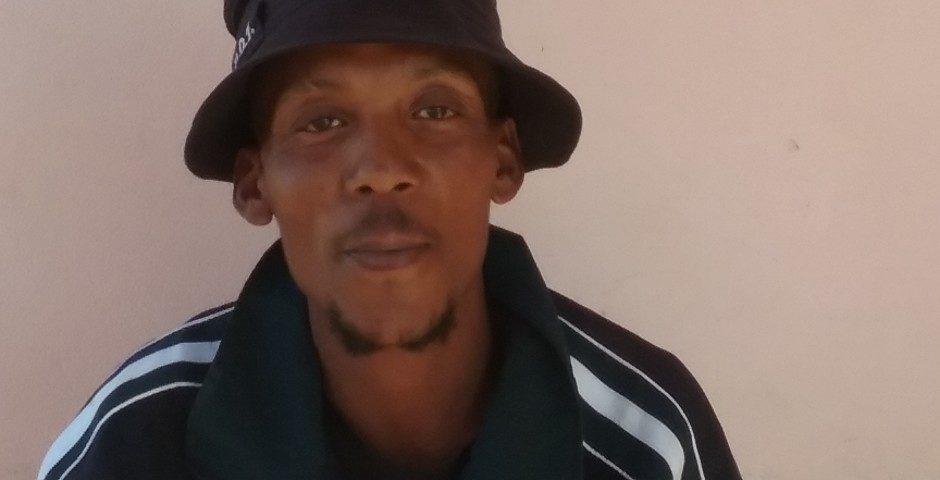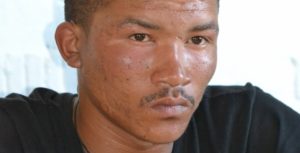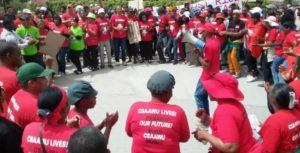
South African farm worker
Andy’s story: ”We just want them to appreciate us”
Andy, a union member, has been working and living on farms most of his life. He has intimate experience with the systematic discrimination and oppression at the farms in South Africa, and he knows the harsh consequences of fighting against exploitation.
Andy Johannes spills out his stories like pearls on a string, only punctuated by short ironic laughs or a “shoh” to signal the absurdity of the situation he’s describing. Some stories are about himself, others are about his acquaintances, his friends and his co-workers: “There are people whose situation is even worse than mine”.
The conditions he speaks of are common to many farm workers: ridiculously low wages, terrible working conditions, poor housing, evictions and the lack of educational and economic opportunities for children. But also the racism and systematic violence they endure, as well as the way the farmers, the ‘bosses’, systematically cooperate to keep their uncontested power, which enables them to continue oppressing and exploiting workers.
Houses painted on the front
Andy came to the Appelsdrift farm when he was 19. He was immediately struck by the awful housing situation of the workers. In the rural parts of South Africa it is customary for farmers to provide housing for their workers as part of the contract, and as the landlord, the farmer is responsible for the maintenance of the houses and granting basic commodities. Yet:
“If you go there you can see maybe the houses are a bit clean, painted in a color. But that is just on the outside. When you go inside you will see that the roof is open or windows are broken. Some houses are just painted on the front, the back still looks like what it is”.
Andy also explains that there is no clean drinking water at the farms: “the water we are using is from the canal, we don’t know when there is a dead thing in the water. […] You may open up the tap and you see, the water is so dirty you can’t drink it. When you boil it it makes a layer of mud”. The farmer, on the other hand, buys his clean water in town. He can cook on his electric stove, while the workers have to make fire to cook food. His children are not running around by themselves during the day while their parents work, and they don’t have to stay home from school due to lack of transportation. Andy says the boss will threaten to have the workers’ children taken away by police for neglect, but “he still wants the parents to work”.
“They are getting richer while we starve at the end of each week”
When Andy started working on the farm in the year 2000, he earned ’the women’s wage’, which was 95 Rand (less than 7 US$) a week. Later he advanced to ’the men’s wage’ of 115 Rand (ca. 8 US$ a week). Today the wages are higher, but still keep people in poverty – he earns 640 Rand in a week (just about 45 US$).
Often the salary only lasts from Friday to Wednesday, leaving nothing for the two remaining days. Labourers are often forced to go to work without eating, and are not even allowed to eat the bruised fruits that fall off the trees. The farmers insist that they can’t afford to pay higher salaries, all while the workers have to stand by and watch them buy new cars and redecorate their houses: “When they say they don’t have money, you must know there’s a new car or they want to build a new house or buy another farm. There is money!”. And there lies a major issue – the rampant inequality. “They’re getting rich and we’re getting poorer by the day”, Andy laments.
Joining a union means being heard
After some years at the farm and many fruitless attempts to confront his boss about the situation, Andy came across two youngsters from the local school who handed him a pamphlet from CSAAWU, one of the unions, and said “Here, these are the right people you must talk to!”. After that his life changed – he had now found a language to communicate what he was going through: ”I’ve become wiser. Then, by the time I got in the union, I didn’t have many ways to talk about my rights and all these things”
In the union, workers can find a place to direct their complaints when the boss is not listening. They have someone who takes them seriously and acts on their behalf. Today, Andy works as a shop steward on his farm: “I started the recruiting in all the other farms there in Appelsdrift and I told the people there: ’We must join the union so we can be stronger against these Boers’. There’s only four white farmers in the area there, but they control a lot of us, we are more than 100 people in that area!”
But there are many obstacles on the road for those who join the fight – not least the discrimination against union members and sympathizers. They have less access and less benefits. The farmers do their best to keep the unions away. They offer rewards for ‘spying’ on the union, thus pitting workers against one another. At the same time, many workers refuse to join the union for fear of the repercussions.
A worker shouldn’t be too clever
“They are making divisions – some are buying cars for the workers or putting them so much in debt that they must come every week and say, ’boss, lend me some money. Or lend me your bucky’. But when you are in a union there’s nothing of that, you must walk with your two feet”. In addition, the farmers warn each other against what they call ‘clever’ workers.
Andy experienced this first hand after he became involved with the union and started asking too many questions. He was fired on false grounds of being an alcoholic. His boss tried to evict him and his family from their home on the farm, but knowing his rights, Andy resisted the eviction (the matter is currently being processed in court).
It was when he started looking for work again that he found out just how connected all the farmers are. He would work for a day or two on another farm before the new boss would come and ask him to leave – his old boss had been calling and saying Andy should not be employed: “They say, this is a clever one. He will teach your people also that”. According to Andy the farmers meet regularly to discuss common issues such as how to deal with a strike or how to keep the wages down.
Farmers buy silence
Yet, the farmers are also afraid of what unions can do. Andy sometimes has workers reporting severe abuses to him – e.g. being beaten by the boss or called a hotnot (derogatory word for a person of colour). He will bring up the issue with the union – but next thing you know, the worker will take back his complaint after the farmer offered him 50 Rand. “They are paying people off just to keep quiet. Because they are so afraid when those things come up and they can go to jail”.
But the problem is not limited to the farmers – there is a (primarily white) elite coalescing against the workers: “When you are taking on the boss, you will get the police, the court, everyone. When you go to a shop and that guy knows – ‘Oh, you are staying on that farm’, he says, ’why are you not leaving the boss alone, he was so nice.’” In the end he will ask him to go shop somewhere else. Once, Andy was blocked by the police along with three others on their way to town. They were told they couldn’t cross the bridge, because the farm bosses were afraid they were going to burn the vineyards: ”We say, ’no we don’t want to burn them, we just want them to appreciate us, because we have been working for a long time for them!’”
The ghost of apartheid
From Andy’s account it’s clear that the farmers use all means available to keep the workers on a short leash and in a position of inferiority. It is the gruesome ghost of apartheid showing its face: “There are many racists here in South Africa, still. It’s insane, it’s very insane, but we must live with it […] They control people, it’s like they are leading a dog.”
But workers stand up for themselves and are battling this system of oppression. Andy’s union registers new members every day. Help Andy and the other workers keep up their fight for a decent life. They need the financial means to unionize and mobilize their communities. But Andy also pleads for the surrounding world to open their eyes to the farm workers’ situation. He urges everybody, especially importers of South African wines and fruit, to come see the situation with their own eyes. Then, maybe, the bosses will be forced to reconsider their racist and exploitative treatment of the same workers who keep the wheels of their farms spinning.
Array

